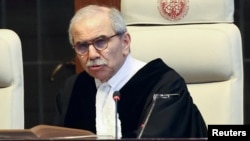A majority of Lebanese lawmakers on Monday put their support behind Nawaf Salam, head of the International Court of Justice, designating him as the country’s next prime minister.
The move comes as a further blow to Hezbollah, which had in previous years successfully blocked Salam from becoming head of government when his name was floated.
United Nations Secretary-General Antonio Guterres welcomed the development.
“I think it's another sign of the positive political trajectory we've seen in Lebanon over the last few days, with finally the election of a president, and now the new government,” his spokesperson, Stephane Dujarric, told reporters.
On Thursday, U.S. and Saudi-backed army commander General Joseph Aoun was elected president, ending a 26-month vacuum in the post.
A country of many different religious sects, Lebanon’s constitution says the president must be a Maronite Christian, the prime minister a Sunni Muslim, and the speaker of the parliament a Shiite Muslim.
Iranian-backed Hezbollah has held sway over the country’s political landscape for years. It has been severely weakened since September, when Israel began targeting and killing its senior leadership — including figurehead Hassan Nasrallah — and waging a monthslong bombing and ground campaign to degrade its ability to fire rockets at northern Israel.
A 60-day ceasefire that paused fighting between Israel and Hezbollah will expire on Jan. 26. The United States, France and other countries had pressed the Lebanese to end the political stalemate and form a new government as the region is rocked with instability.
The U.N. Security Council met Monday in a closed-door session for more than two hours to discuss developments, including the ceasefire.
“We are in the final, and therefore, most critical, stage,” U.N. Special Coordinator Jeanine Hennis-Plasschaert told the council, according to a statement from her office. She urged all parties to make sure that the “clock does not run out” without a “common and clear understanding of where things stand, or how to manage expectations” of the cessation of hostilities.
The U.N. secretary-general will visit Lebanon later this week, in what his spokesperson called a “solidarity” visit.
“In Beirut he will be meeting with the Lebanese political leadership and others,” said spokesperson Dujarric. “The secretary-general is also expected to travel to southern Lebanon to see the U.N. peacekeeping force [UNIFIL] and express his support and his thanks for the work they've been doing in very challenging circumstances.”
New prime minister
Salam, 71, is an academic, former diplomat and jurist.
He has been the president of the International Court of Justice in The Hague for nearly one year and a judge on the court since 2018. He is reported to be returning to Lebanon on Tuesday.
He had a long career as a diplomat — serving for a decade as Lebanon’s ambassador to the United Nations from 2007 to 2017, including a two-year term on the Security Council.
Holding degrees in politics, history and law from top universities in Lebanon, France and the United States, Salam is considered a technocrat rather than a politician.
Salam and his new government will have no shortage of challenges to sort out. Major Shiite areas around the capital and a large swath of southern Lebanon will have to be rebuilt after Israel’s intense bombing campaign leveled scores of apartment blocks and villages, leaving tens of thousands homeless. But Salam will have to find international financing, as Hezbollah is unlikely to be able to fund reconstruction as it did after its 2006 war with Israel, in light of its weakened position.
The country has also been mired in a crippling economic crisis since 2019, with the Lebanese lira losing 90% of its value against the U.S. dollar, wiping out the savings of millions of Lebanese.




